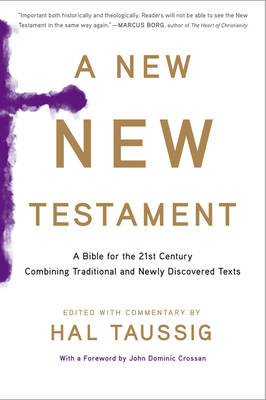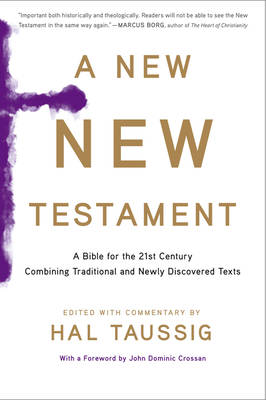
En raison d'une grêve chez bpost, votre commande pourrait être retardée. Vous avez besoin d’un livre rapidement ? Nos magasins vous accueillent à bras ouverts !
- Retrait gratuit dans votre magasin Club
- 7.000.000 titres dans notre catalogue
- Payer en toute sécurité
- Toujours un magasin près de chez vous
En raison de la grêve chez bpost, votre commande pourrait être retardée. Vous avez besoin d’un livre rapidement ? Nos magasins vous accueillent à bras ouverts !
- Retrait gratuit dans votre magasin Club
- 7.000.0000 titres dans notre catalogue
- Payer en toute sécurité
- Toujours un magasin près de chez vous
A New New Testament
A Bible for the Twenty-First Century Combining Traditional and Newly Discovered Texts
Hal Taussig
Livre broché | Anglais
20,45 €
+ 40 points
Description
It is time for a new New Testament.
Over the past century, numerous lost scriptures have been discovered, authenticated, translated, debated, celebrated. Many of these documents were as important to shaping early Christian communities and beliefs as what we have come to call the New Testament. These were not the work of shunned sects or rebel apostles, not alternative histories or doctrines, but part of the vibrant conversations that sparked the rise of Christianity. Yet these scriptures are rarely read in contemporary churches; they are discussed almost only by scholars or within the context only of gnostic gospels. Why should these books be set aside? Why should they continue to be lost to most of us? And don't we have a great deal to gain by placing them back into contact with the twenty-seven books of the traditional New Testament--by hearing, finally, the full range of voices that formed the early chorus of Christians?
To create this new New Testament, Hal Taussig called together a council of scholars and spiritual leaders to discuss and reconsider which books belong in the New Testament. They talked about these recently found documents, the lessons therein, and how they inform the previously bound books. They voted on which should be added, choosing ten new books to include in a new New Testament. Reading the traditional scriptures alongside these new texts--the Gospel of Luke with the Gospel of Mary, Paul's letters with The Letter of Peter to Philip, The Revelation to John with The Secret Revelation to John--offers the exciting possibility of understanding both the new and the old better. This new reading, and the accompanying commentary in this volume, promises to reinvigorate a centuries-old conversation and to bring new relevance to a dynamic tradition.
Over the past century, numerous lost scriptures have been discovered, authenticated, translated, debated, celebrated. Many of these documents were as important to shaping early Christian communities and beliefs as what we have come to call the New Testament. These were not the work of shunned sects or rebel apostles, not alternative histories or doctrines, but part of the vibrant conversations that sparked the rise of Christianity. Yet these scriptures are rarely read in contemporary churches; they are discussed almost only by scholars or within the context only of gnostic gospels. Why should these books be set aside? Why should they continue to be lost to most of us? And don't we have a great deal to gain by placing them back into contact with the twenty-seven books of the traditional New Testament--by hearing, finally, the full range of voices that formed the early chorus of Christians?
To create this new New Testament, Hal Taussig called together a council of scholars and spiritual leaders to discuss and reconsider which books belong in the New Testament. They talked about these recently found documents, the lessons therein, and how they inform the previously bound books. They voted on which should be added, choosing ten new books to include in a new New Testament. Reading the traditional scriptures alongside these new texts--the Gospel of Luke with the Gospel of Mary, Paul's letters with The Letter of Peter to Philip, The Revelation to John with The Secret Revelation to John--offers the exciting possibility of understanding both the new and the old better. This new reading, and the accompanying commentary in this volume, promises to reinvigorate a centuries-old conversation and to bring new relevance to a dynamic tradition.
Spécifications
Parties prenantes
- Auteur(s) :
- Editeur:
Contenu
- Nombre de pages :
- 640
- Langue:
- Anglais
Caractéristiques
- EAN:
- 9780544570108
- Date de parution :
- 01-09-15
- Format:
- Livre broché
- Format numérique:
- Trade paperback (VS)
- Dimensions :
- 157 mm x 239 mm
- Poids :
- 635 g

Les avis
Nous publions uniquement les avis qui respectent les conditions requises. Consultez nos conditions pour les avis.






